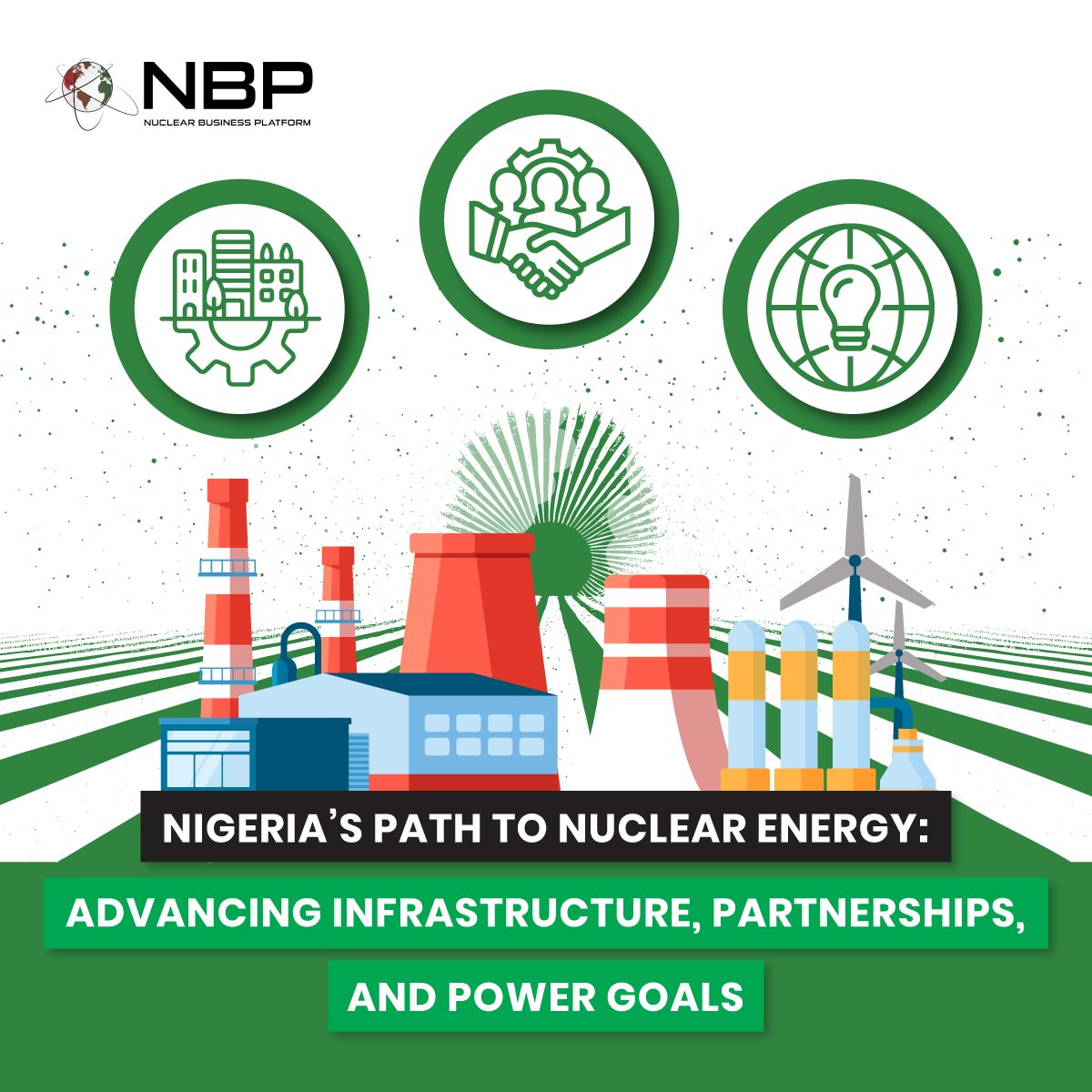Nigeria’s Path to Nuclear Energy: Advancing Infrastructure, Partnerships, and Power Goals
As Nigeria progresses toward industrialization and navigates its population boom, the country faces rapidly increasing energy demands. In response, Nigeria has embraced nuclear power as a transformative element of its energy strategy. With a commitment to diversifying its energy mix and implementing an ambitious roadmap for nuclear development, Nigeria is emerging as a leader in Africa’s nuclear energy renaissance.
The Role of Nuclear Energy in Nigeria’s Energy Mix
Nigeria’s vision for a diversified energy portfolio aims to achieve a capacity of 29.7 GW by 2030. This includes gas (43%), solar (22%), hydropower (20%), and nuclear energy (8%), among other resources (the timeline might have shifted by a few years). Nuclear power, with its ability to deliver consistent, large-scale baseload energy, holds a critical position within this framework.
The country’s escalating energy needs, driven by expanding residential, commercial, and industrial activities, underline the necessity of nuclear power. Speaking at the 2024 Africa Nuclear Business Platform (AFNBP), Professor Abdullahi Mati, Director of the Nuclear Power Plant Development Directorate at the Nigeria Atomic Energy Commission (NAEC), emphasized privatization as a cornerstone of Nigeria's energy reform. "The government has privatized over 70% of its generating stations," he stated, adding that this shift is fostering efficiency, innovation, and investment—vital for accelerating the integration of nuclear technology into the energy landscape.
Strategic Advancements in Nuclear Energy
Nigeria's nuclear program has achieved significant milestones, placing the country among Africa’s tier-1 nations in nuclear development. Currently in Phase 2 of the International Atomic Energy Agency’s (IAEA) Milestone Approach, Nigeria has progressed beyond feasibility studies to focus on preparatory activities for contracting and constructing its first nuclear power plant. Between 2017 and 2023, the Integrated Work Plan (IWP) provided a systematic framework for developing infrastructure, regulatory systems, and human capital.
Nigeria is also evaluating both large-scale nuclear reactors and Small Modular Reactors (SMRs) to align with diverse energy needs and infrastructure requirements. The nation has held productive discussions with global nuclear leaders such as Russia, China, and South Korea, exploring advanced technologies and collaborative financing models. This diplomatic engagement highlights Nigeria’s commitment to adopting equitable, sustainable solutions for nuclear development.
Significant progress has also been made in site selection, with Geregu in Kogi State and Akwa Ibom on the coast emerging as top candidates for nuclear power plant locations. These sites were identified based on rigorous evaluations, including geological, environmental, and logistical assessments.
Addressing Energy Demand with Nuclear Power
Nigeria’s projected electricity demand demonstrates the urgency of nuclear integration. Under a medium-growth scenario, which assumes a GDP growth rate of 5.9% per year, electricity consumption is expected to rise by 5.4% annually. Meeting this demand will require commissioning two 1.2 GW nuclear power units by 2034. In a high-growth scenario, with a GDP growth rate of 7.5%, the need intensifies to four 1.2 GW units by 2038.
Professor Mati expressed optimism, stating,"We have made substantial progress in the development of our integrated nuclear infrastructure to support the deployment of NPP. Now high-level engagement with governments and key players of the economy could fast-track the deployment of the NPP within the record time which we hope to achieve very soon."
Forging International Partnerships
Nigeria’s leadership in nuclear energy is bolstered by robust international partnerships. Intergovernmental Agreements (IGAs) with nations such as Russia, China, and South Korea facilitate knowledge exchange and technical expertise. These collaborations are pivotal for developing infrastructure, ensuring regulatory readiness, and adopting cutting-edge nuclear technologies.
A noteworthy highlight is Nigeria’s participation in the U.S.-led Foundational Infrastructure for Responsible Use of Small Modular Reactor Technology (FIRST) program. This initiative supports Nigeria’s exploration of advanced nuclear solutions, including SMRs, while ensuring compliance with the highest standards of safety and security.
Human Resource Development: Empowering the Future
A cornerstone of Nigeria’s nuclear strategy is the cultivation of human capital. Domestically, NAEC has introduced bridging programs in nuclear engineering and physics, while partnering with national universities to establish advanced degree courses. Internationally, Nigeria collaborates with countries like the U.S., Russia, China, and South Korea to enhance capacity building. Programs range from technical training to graduate studies, ensuring a steady pipeline of skilled professionals.
With its emphasis on human resource development, Nigeria aims to become a hub for nuclear expertise in Africa, providing training and guidance to other nations on the continent.
2025 Milestones and Beyond
By 2025, Nigeria seeks to achieve critical goals, including:
Operationalizing existing facilities like the Gamma Irradiation Facility.
Launching a multipurpose research reactor program.
Completing advanced feasibility studies for nuclear sites.
Strengthening nuclear education and training initiatives.
Pioneering Institutions
NAEC is at the helm of Nigeria’s nuclear journey, overseeing strategic planning, international collaborations, and adherence to global safety standards. Complementing its efforts, the Nigerian Nuclear Regulatory Authority (NNRA) ensures rigorous oversight of radiation safety and licensing, safeguarding public health and the environment.
A Promising Future
Nigeria’s nuclear energy program represents a transformative step toward sustainable energy independence. With an integrated roadmap, international collaborations, and a focus on capacity building, Nigeria is well-positioned to lead Africa into a new era of nuclear energy innovation. Its ambitious efforts not only promise a solution to domestic energy challenges but also exemplify a model for harnessing nuclear power to drive regional development.
Looking ahead, the next edition of the Africa Nuclear Business Platform is set to take place in Morocco from April 22 to 24, 2025, offering another opportunity for stakeholders to engage and propel nuclear energy solutions forward in Africa. Stay tuned for updates on this milestone event! Additionally, don’t miss our Hotseat Interview with the new Acting Chairman of the Nigeria Atomic Energy Commission (NAEC), where we will delve into Nigeria’s progress, future plans, and insights on positioning nuclear power as a transformative force in Africa. Keep an eye out for its release soon!


